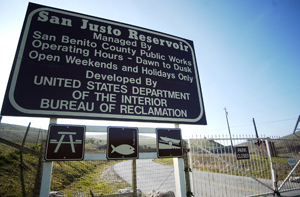Discovery results in restrictions at San Justo Reservoir
An unassuming mollusk not previously known to occur in
California was confirmed in San Benito County this week, posing a
double threat of wreaking havoc with the state’s elaborate water
system and competing with native wildlife.
Discovery results in restrictions at San Justo Reservoir
An unassuming mollusk not previously known to occur in California was confirmed in San Benito County this week, posing a double threat of wreaking havoc with the state’s elaborate water system and competing with native wildlife.
San Justo Reservoir is closed to boating until further notice, following the recent discovery of an introduced exotic, the zebra mussel.
Should the mussels spread throughout California, the impact could rock everything from agriculture to municipal water systems to commercial and sport fishing. The impact would be enormous.
The discovery of the mussels at San Justo is especially troubling because it is a link in the enormous San Felipe Project. San Felipe is part of the U.S. Bureau of Reclamation’s statewide water distribution network and pipes link San Justo ultimately to the entire network. From there, the water network spreads across the Central Valley, into the Delta and as far north as the Cascade Range.
The unassuming-looking bivalve was first introduced to the Great Lakes region, probably from Russia, in 1988, according to the National Invasive Species Information Center. The mussels are believed to have been carried in the ballast water of one or more ships.
The pests quickly developed into an expensive and ecologically devastating plague throughout the Great Lakes Basin and beyond.
State Department of Fish and Game biologists are studying the find, and endeavoring to find how many may have made their way into the popular fishing spot. Harry Morse of the Department of Fish and Game in Sacramento confirmed Wednesday that a lab at the state Department of Food and Agriculture determined a clump of mussels found by a fisherman at the reservoir last week were, in fact, zebra mussels.
Morse would not speculate on the severity of the infestation.
“We’re going back in and taking a better survey,” Morse said. “First we wanted to verify that it was zebra mussels.”
“Right now it appears to be in a limited area,” Morse said. “But we have these concerns because it can do a lot of damage once it’s escaped into a system.”
Fish and Game employees are scheduled to attend a workshop to learn how to identify the mussels in Fresno Feb. 23. Zebra mussels are closely related to another recently discovered exotic in California, the quagga mussel. That mussel has spread throughout much of the state, and DFG employees are working to train dogs to sniff them out.
The striped mussels seldom grow over 2 inches long, according to the California Department of Water Resources. Found only in fresh water, they anchor themselves to a stationary object, much like their ocean-dwelling cousins.
What separates zebra mussels from natives is their ability to produce with staggering dedication.
According to the Water Resources Web site, “zebra mussels cause devastating impacts on municipal water systems, water recreation opportunities and businesses and fisheries.”
The mussels often form enormous clumps, clogging pumps and blocking pipelines. The cost, should they spread throughout California, would be calculated in the millions, Water Resources said. Prior to the recent discovery, they were not believed to exist outside Eastern and Midwestern states.
How the small shellfish may have traveled to San Benito County remains a mystery, said Lance Johnson, director of the San Benito County Water District. But the person who introduced the exotic pests to San Justo probably was an unwitting ally.
Like many marine mammals, the mussels have a free-swimming larval stage. The nearly invisible larvae could have been transported in a few inches of water left in a boat’s bait well after a trip to Oklahoma or Kansas, for example.
As filter feeders, large populations of zebra mussels can sweep bodies of water clean of other free floating larvae, effectively vacuuming much native wildlife from a site.
The San Justo recreation area just west of Hollister remains open to other uses, said Johnson, “In the interim they have requested closure of San Justo to boating,” Johnson confirmed.
Arman Nazemi, engineer at county public works, emphasized that all visitors should be careful, as the mussel larvae can travel to other bodies of water on boots or shoes.
A telephone call to the concessionaire at the Union Road reservoir was answered by a machine indicating winter hours are limited to weekends only. No mention was made of the boating restrictions.
“How long this [San Justo closure] is going to be, I have no idea,” the water district’s Johnson said. “It could be permanently.”
The reservoir is a popular recreational venue, one that attracts visitors as well as local residents. The impact of a lengthy closure cannot yet be determined, according to county Supervisor Anthony Botelho, whose district includes San Justo.
“We’re all kind of having a panic about it right now,” Botelho said. “This is a huge problem. It plugs up irrigation systems… and on top of that, if that water is released you do have some possible drainage issues, and then we could even contaminate the Pajaro.”
“If you drain San Justo, there’s a lot of farmland and agricultural business dependent on that water,” Botelho said. “It wouldn’t just affect the farm operators but the people they employ. And the money that agriculture generates would be felt throughout the community.”
Botelho noted that should it become necessary to poison the mussels, the impact could be dramatic for the area’s many organic farms.
“We have to take action sooner rather than later to control any infestation,” Botelho said.









